Text
The Cost of a Natural Burial: What You Need to Know
Natural burials, also known as green burials, have gained popularity in recent years as an eco-friendly and often more personal alternative to traditional burial methods. Understanding the costs associated with natural burials is essential for those considering this option for themselves or their loved ones. This guide will help you navigate the financial aspects of natural burials, ensuring you make informed decisions during a sensitive time.
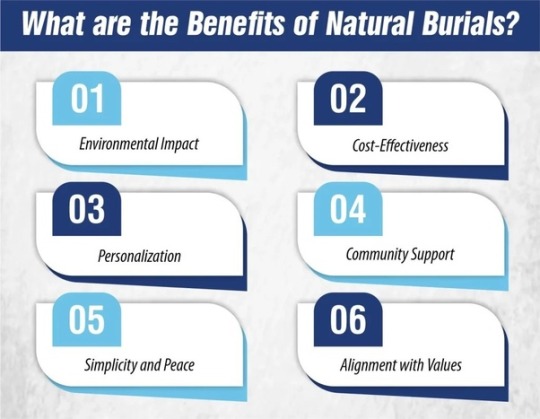
What is a Natural Burial?
A natural burial focuses on minimizing environmental impact. It typically involves burying the body in a biodegradable coffin or shroud without embalming fluids, and in a manner that allows the body to decompose naturally. Natural burials often take place in designated natural burial grounds, which are managed to support conservation and sustainability.
Components of a Natural Burial
Plot Purchase: The cost of a burial plot in a natural burial ground can vary widely depending on location, demand, and the specific cemetery. On average, plots range from $1,000 to $4,000, though some can be higher, especially in urban areas.
Burial Container: Biodegradable coffins, caskets, or shrouds are used in natural burials. The cost of these items varies:
Biodegradable Coffins: Typically made of materials like bamboo, wicker, or cardboard, these can range from $200 to $2,000.
Shrouds: Made of natural fabrics like cotton or linen, shrouds are usually more affordable, costing between $50 and $500.
Grave Preparation and Opening: The process of digging and preparing the grave, known as opening and closing, typically costs between $300 and $1,500. This fee can include the digging of the grave, placing the body or container, and filling the grave.
Grave Marker: Natural burial grounds often use simple, natural markers like engraved stones or native plants. The cost of these markers varies widely, from $50 for a small stone to $1,000 or more for custom options.
FOR MORE DETAILS PLEASE VISIT:
The Cost of a Natural Burial: What You Need to Know - Insure Final Expense
0 notes
Text
Graded Death Benefit Life Insurance Policy: A Complete Guide for Customers
When considering life insurance options, one term that might surface is a "Graded Death Benefit Life Insurance Policy." This unique type of life insurance offers particular benefits tailored for individuals with specific needs, especially those who may face challenges qualifying for traditional life insurance due to health issues. This guide aims to provide a comprehensive overview of what a Graded Death Benefit Life Insurance Policy entails, how it works, and who it might benefit.
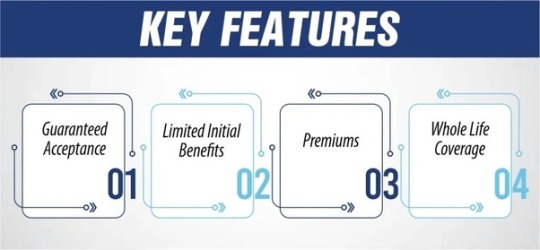
What is a Graded Death Benefit Life Insurance Policy?
A Graded Death Benefit Life Insurance Policy is a type of whole life insurance designed primarily for individuals who have health issues that might make obtaining standard life insurance challenging. Unlike traditional policies that pay out the full death benefit from day one, a graded death benefit policy has a waiting period before the full benefit is available.
How Does It Work?
The structure of a graded death benefit policy is relatively straightforward:
Waiting Period: Typically, there is a waiting period of 2-3 years from the policy's inception. During this period, the policy will not pay out the full death benefit if the insured dies due to natural causes.
Payout Structure: If the insured dies within the waiting period due to natural causes, the beneficiaries receive a portion of the death benefit, which usually increases each year. For example, in the first year, beneficiaries might receive 30% of the death benefit, 70% in the second year, and the full benefit after the waiting period ends.
Return of Premiums: Many policies offer a return of premiums paid plus a small percentage if the insured dies during the waiting period. This ensures that the policyholder's family receives at least the amount paid into the policy, providing some financial relief.
Who Should Consider a Graded Death Benefit Life Insurance Policy?
This type of policy is particularly suited for:
Individuals with Health Issues: Those who have significant health problems that disqualify them from standard life insurance policies might find graded death benefit policies a viable option. Since these policies often do not require a medical exam, they are more accessible.
Older Adults: Seniors who have not secured life insurance earlier and now face age-related health issues may benefit from this type of policy.
Those Needing Immediate Coverage: While full benefits aren’t available immediately, having some coverage can provide peace of mind for individuals and their families during the initial period.
FOR MORE DETAILS PLEASE VISIT:
Graded Death Benefit Life Insurance Policy: A Complete Guide - Insure Final Expense
0 notes
Text
What Color Flowers Are Used for Funerals: A Complete Guide
Flowers have long been a part of funeral traditions, offering a way to express sympathy, honor the deceased, and provide comfort to grieving families. The choice of flowers and their colors can convey different sentiments and emotions. This guide will help you understand the significance of flower colors and the types of flowers typically used in funerals, ensuring you select the most appropriate arrangement for the occasion.

The Meaning of Flower Colors at Funerals:
White Flowers: Symbolize purity and peace. Common choices: lilies, roses, chrysanthemums.
Red Flowers: Represent love and respect. Common choices: roses, carnations.
Pink Flowers: Convey grace and sympathy. Common choices: roses, lilies.
Yellow Flowers: Signify friendship and warmth. Common choices: roses, chrysanthemums.
Blue Flowers: Indicate peace and tranquility. Common choices: delphiniums, irises.
Purple Flowers: Denote dignity and admiration. Common choices: orchids, irises.
Mixed Colors: Express a range of emotions and can be customized.
Common Types of Funeral Flowers:
Lilies: Symbolize purity and are often used in sprays and casket arrangements.
Roses: Versatile for expressing love and respect; used in various arrangements.
Chrysanthemums: Associated with mourning; common in wreaths and sprays.
Carnations: Represent love and remembrance; used in sprays and standing arrangements.
Gladioli: Symbolize strength and sincerity; used in standing sprays.
Orchids: Signify eternal love; used in bouquets and as potted plants.
Hydrangeas: Express heartfelt emotions; used in lush arrangements.
Choosing Funeral Flowers:
Consider your relationship with the deceased, cultural traditions, and the deceased’s preferences. Select flowers that honor their memory and provide comfort to grieving loved ones.
FOR MORE DETAILS PLEASE VISIT:
What Color Flowers For Funeral Are Used: A Complete Guide - Insure Final Expense
0 notes
Text
Is Cremation Cheaper Than Burial? A Comparative Guide for Customers
When faced with the death of a loved one, the decision between cremation and burial often hinges on several factors, with cost being one of the most significant. This guide aims to provide a clear comparison of the expenses involved in both options to help you make an informed choice during this difficult time.
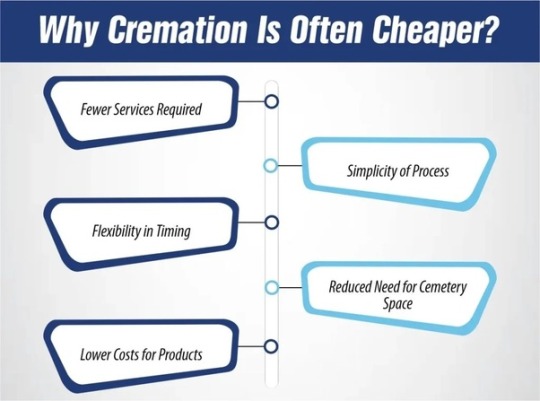
The Basics: Understanding Cremation and Burial
Cremation: This process involves reducing the body to ashes through intense heat. The ashes, often called cremains, can be stored in an urn, scattered, or buried.
Burial: This traditional method involves placing the body in a casket and then interring it in a cemetery plot. It often includes a funeral service, viewing, and a grave marker.
Cost Breakdown:
Cremation Costs:
Direct Cremation: This is the most economical option, where the body is cremated shortly after death without a funeral service. The average cost ranges from $500 to $3,000.
Cremation with Memorial Service: Involves a memorial service held after the cremation. Costs include the service itself and the urn, typically ranging from $1,500 to $4,000.
Burial Costs:
Traditional Burial: Includes embalming, a casket, a burial plot, a grave marker, and the funeral service. The average cost ranges from $7,000 to $12,000.
Green Burial: An eco-friendly option that avoids embalming and uses biodegradable caskets. Costs typically range from $2,000 to $5,000, but prices can vary based on the cemetery's policies.
FOR MORE DETAILS PLEASE VISIT:
Is Cremation Cheaper Than Burial? Compare Affordable Options - Insure Final Expense
0 notes
Text
Prepaid Funeral Plans: Types, Benefits, and Drawbacks
Planning for the inevitable can be a daunting task, but prepaid funeral plans offer a way to alleviate the financial and emotional burden on loved ones when the time comes.
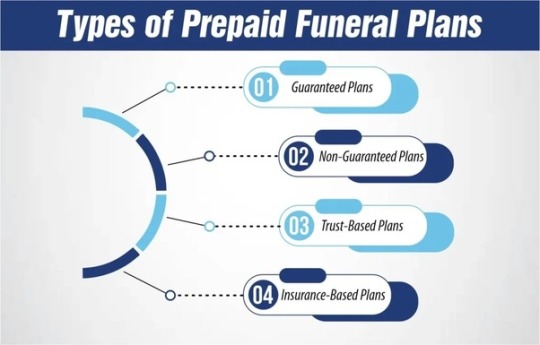
Here, we explore the types of prepaid funeral plans available, along with their benefits and potential drawbacks, to help you make an informed decision.
Types of Prepaid Funeral Plans:
Traditional Prepaid Funeral Plans: These plans involve a contract with a funeral home or provider where you prepay for the services and products you choose. They often cover items such as the casket, embalming, transportation, and the ceremony itself. The cost is typically fixed at today's prices, regardless of future inflation.
Guaranteed Funeral Plans: Similar to traditional plans, guaranteed plans ensure that the services and products you select are fully covered, even if their prices increase over time. This guarantees that your family won't face additional expenses at the time of the funeral.
Benefits of Prepaid Funeral Plans:
Financial Security: Prepaying for a funeral ensures that the financial burden is not placed on your family at a time of grief. The costs are covered, and your loved ones can focus on remembering you.
Price Locking: Many plans allow you to lock in current prices for funeral services and products, protecting you from inflation and rising costs in the future.
Drawbacks of Prepaid Funeral Plans:
Limited Flexibility: Once you purchase a prepaid plan, changing the details can be difficult and sometimes costly. If you move to a different area, the plan may not be transferable to a new funeral home.
Financial Risks: If the funeral home or provider goes out of business, your funds might be at risk. It’s crucial to ensure that your plan is with a reputable company that has safeguards in place.
FOR MORE DETAILS PLEASE VISIT:
Prepaid Funeral Plans: Types ,Benefits and Drawbacks - Insure Final Expense
0 notes
Text
Survivor Benefit Plan vs. Life Insurance: A Military Comparison for Customers
Planning for the financial future of your loved ones is a critical aspect of long-term financial security, particularly for those in the military. Two primary options often considered are the Survivor Benefit Plan (SBP) and life insurance. Each has distinct features, advantages, and drawbacks. This article will help military personnel and their families understand and compare these options to make informed decisions.
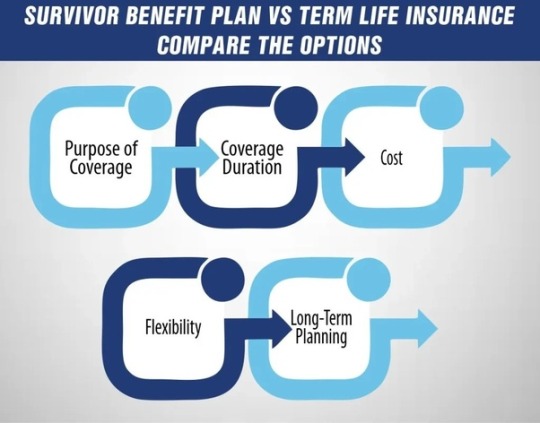
Overview of the Survivor Benefit Plan (SBP):
The Survivor Benefit Plan is a government-provided benefit that offers ongoing income to surviving spouses or eligible children of deceased military retirees. It is essentially an annuity that provides a percentage of the retiree’s pension to the beneficiaries upon the retiree's death.
Key Features of SBP:
Coverage and Cost: SBP provides up to 55% of the retiree's military pension. The cost is a percentage of the retired pay and is deducted from the retiree's monthly pension.
Eligibility: Spouses, children, or a combination of both can be beneficiaries. Children are eligible until they reach 18 (or 22 if in school) or indefinitely if they are disabled.
Inflation Protection: SBP payments are adjusted for inflation, maintaining the purchasing power over time.
Tax Treatment: Premiums are paid with pre-tax dollars, which can lower taxable income.
Overview of Life Insurance:
Life insurance provides a lump sum payment to the beneficiaries upon the policyholder's death. Policies vary widely in terms of coverage, cost, and additional features.
Key Features of Life Insurance:
Types of Policies: Term life insurance provides coverage for a specified period, while whole life insurance offers lifetime coverage with a savings component.
Coverage Amount: Policyholders can choose coverage amounts to meet their financial needs, often far exceeding the payout from SBP.
Premiums: Vary based on age, health, policy type, and coverage amount. Term life is generally less expensive than whole life insurance.
Beneficiaries: Can be anyone chosen by the policyholder, including family members, friends, or entities.
Tax Treatment: Death benefits are generally tax-free for beneficiaries.
FOR MORE DETAILS PLEASE VISIT:
Survivor Benefit Plan vs Life Insurance: A Military Comparison - Insure Final Expense
0 notes
Text
Attorney for Death Benefits: Ensuring Your Rights & Benefits
Losing a loved one is a challenging and emotional experience. Amidst the grieving process, dealing with financial and legal matters can feel overwhelming. One significant aspect that needs attention during such times is claiming death benefits. Hiring an attorney for death benefits can be an essential step in ensuring that your rights and benefits are fully protected. This guide will help you understand the importance of an attorney in this process and how they can assist you.
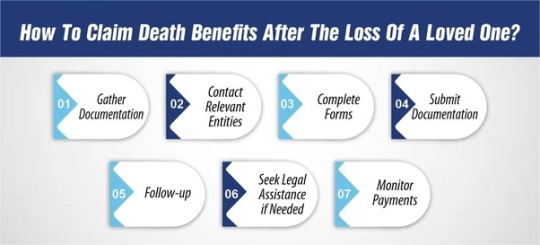
Understanding Death Benefits:
Death benefits are payments made to beneficiaries upon the death of an individual. These benefits can come from various sources, including:
Life Insurance Policies: Payouts from life insurance plans that the deceased held.
Pension Plans: Benefits from the deceased’s employer-sponsored pension or retirement plans.
Social Security: Survivor benefits provided by the Social Security Administration.
Workers' Compensation: Benefits for dependents if the death was work-related.
Veterans' Benefits: Payments from the Department of Veterans Affairs for eligible family members of deceased veterans.
Navigating these different sources and ensuring you receive the appropriate benefits can be complex. An attorney specializing in death benefits can provide invaluable assistance.
Why You Need an Attorney for Death Benefits:
Expertise and Knowledge:
Attorneys specializing in death benefits possess in-depth knowledge of the laws and regulations governing these benefits. They understand the intricacies involved in filing claims and can guide you through the process efficiently. Their expertise ensures that you do not miss out on any entitled benefits due to procedural errors or lack of information.
Paperwork and Documentation:
Filing for death benefits often requires substantial paperwork, including death certificates, insurance policies, and other legal documents. An attorney will help you gather, organize, and submit the necessary paperwork accurately and promptly, reducing the risk of claim denial due to incomplete or incorrect documentation.
FOR MORE DETAILS PLEASE VISIT:
Attorney for Death Benefits: Ensuring Your Rights & Benefits - Insure Final Expense
0 notes
Text
Old Mutual Funeral Policy: Easy Claims & Comprehensive Cover
Planning for the inevitable is a crucial aspect of financial stability and peace of mind. Old Mutual, a trusted name in the insurance industry, offers a comprehensive funeral policy designed to alleviate the financial burden that comes with the loss of a loved one. With straightforward claims processes and extensive coverage options, Old Mutual ensures that customers can focus on honoring their departed family members without the added stress of financial concerns.

Comprehensive Coverage
Old Mutual's Funeral Policy is designed to cater to a wide range of needs, providing comprehensive coverage that includes:
Funeral Expenses: The policy covers the costs associated with the funeral service, including the casket, burial or cremation, and other related expenses.
Family Cover: Policyholders can extend coverage to include family members, ensuring that all loved ones are protected under a single policy. This can include spouses, children, and even extended family members such as parents and in-laws.
Accidental Death Benefit: In the unfortunate event of an accidental death, Old Mutual provides an additional payout to help cover unexpected costs.
Repatriation Services: If a family member passes away while traveling, the policy includes repatriation services to transport the deceased back to their home country, ensuring a dignified return.
Premium Waiver: Upon the death of the main policyholder, the policy may offer a premium waiver, ensuring that the remaining family members continue to be covered without additional financial burden.
Easy Claims Process:
Old Mutual understands that dealing with administrative tasks during a time of grief can be overwhelming. Therefore, they have streamlined their claims process to be as straightforward and stress-free as possible:
Prompt Notification: The first step is to notify Old Mutual of the policyholder’s death. This can be done via a phone call, email, or by visiting a branch in person. The customer service team is trained to handle these sensitive situations with empathy and efficiency.
Document Submission: To process the claim, Old Mutual requires certain documents, including the death certificate, policy document, and identification of the claimant. In some cases, additional documents may be requested to verify the claim.
Claim Assessment: Once all the necessary documents are submitted, Old Mutual’s claims department will assess the claim. This process is typically swift, aiming to provide a decision within a few days.
Payout: Upon approval, the claim payout is processed promptly. The funds are usually disbursed directly to the beneficiary’s bank account, ensuring quick access to the necessary funds to cover funeral expenses.
FOR MORE DETAILS PLEASE VISIT:
https://insurefinalexpense.com/old-mutual-funeral-policy/
0 notes
Text
How to Pay for a Funeral with Life Insurance: A Comprehensive Guide
When a loved one passes away, managing the emotional and financial aspects can be overwhelming. One of the significant expenses that often comes up is the cost of the funeral. Fortunately, life insurance can be a valuable resource to cover these costs. Here’s a detailed guide to help you understand how to use life insurance to pay for a funeral.
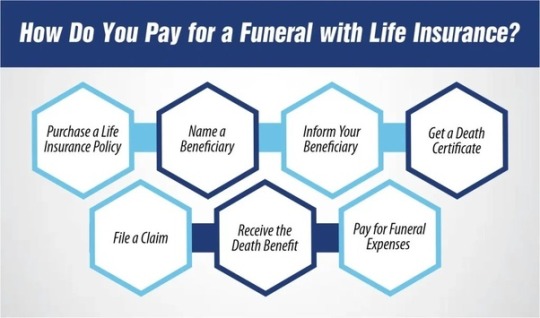
Understanding Life Insurance Policies:
Life insurance policies are designed to provide financial support to beneficiaries after the policyholder’s death. These policies can be categorized mainly into term life insurance and whole life insurance. Both types can be used to pay for funeral expenses, but the process can vary slightly.
Steps to Pay for a Funeral with Life Insurance:
Review the Policy:
Beneficiary Designation: Ensure that you know who the beneficiaries are. This is crucial because only the designated beneficiaries have the legal right to claim the insurance proceeds.
Claim Process: Contact the life insurance company to inform them of the policyholder’s death. They will provide you with the necessary forms and instructions for filing a claim.
File a Claim:
Claim Form: Complete the claim form provided by the insurance company. Ensure all information is accurate and complete.
Processing Time:
Waiting Period: Insurance companies typically process claims within a few weeks, but this can vary. Check with the company for specific timelines.
Receiving the Death Benefit:
Lump Sum Payment: Most life insurance policies pay out in a lump sum to the beneficiaries. Once the claim is approved, the funds will be disbursed directly to the beneficiaries.
Paying for the Funeral:
Direct Payment: If the funeral home accepts assignment of benefits, provide them with the necessary information, and they will handle the paperwork with the insurance company.
FOR MORE DETAILS PLEASE VISIT:
How Do You Pay for a Funeral with Life Insurance?
0 notes
Text
Final Expense Network: Reviews, Wholesale, & Commercial Info
Final Expense Network is a prominent player in the insurance industry, specializing in providing final expense insurance policies. This type of insurance, also known as burial or funeral insurance, is designed to cover end-of-life expenses, ensuring that families are not burdened with financial stress during a difficult time. This article provides a comprehensive overview of Final Expense Network, including customer reviews, wholesale options, and commercial information.
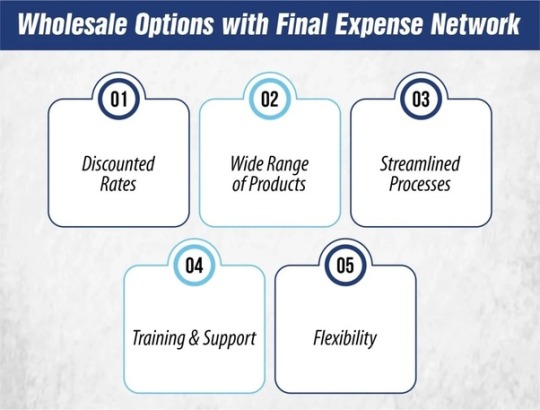
Customer Reviews
When considering an insurance provider, customer reviews are a crucial aspect of the decision-making process. Final Expense Network has garnered a range of reviews, highlighting various aspects of their service.
Positive Reviews
Many customers praise Final Expense Network for their exceptional customer service and straightforward policy options. Clients often highlight the following points:
Ease of Application: Customers appreciate the simple and hassle-free application process, which can often be completed online or over the phone.
Responsive Support: The network's customer service is noted for being responsive and helpful, providing clear answers to policy-related questions.
Affordable Premiums: Many reviews mention the competitive pricing of their policies, which offer peace of mind without breaking the bank.
Areas for Improvement
While the majority of reviews are positive, some customers have pointed out areas
where Final Expense Network could improve:
Policy Clarity: A few clients have reported that they would appreciate more detailed explanations of policy terms and conditions.
Claim Processing Time: Some customers have experienced delays in claim processing, although this is not a widespread issue.
FOR MORE DETAILS PLEASE VISIT:
Final Expense Network: Reviews, Wholesale, & Commercial Info
0 notes
Text
Anthony Martin Final Expense: Exploring His Success Story
In the world of insurance, where trust and reliability are paramount, certain individuals stand out due to their exceptional service and commitment to clients. Anthony Martin is one such notable figure, especially in the niche of final expense insurance. His success story is not just about building a thriving business but also about the profound impact he has made on the lives of countless individuals seeking financial peace of mind for their final expenses.
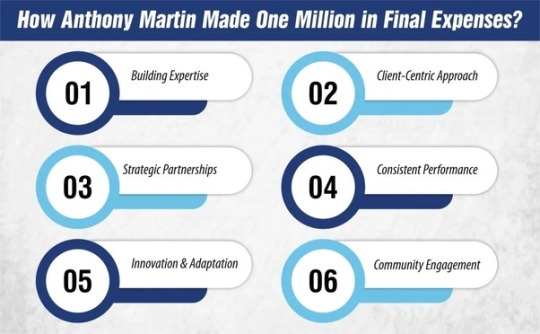
Understanding Final Expense Insurance
Before delving into Anthony Martin's journey, it is essential to understand what final expense insurance entails. This type of insurance, also known as burial or funeral insurance, is designed to cover expenses associated with an individual’s end-of-life costs. These can include funeral services, burial or cremation, and other related expenses. Final expense insurance provides a relatively small death benefit, typically ranging from $5,000 to $25,000, and is aimed at ensuring that the insured’s family is not burdened with these costs during an emotionally difficult time.
Anthony Martin: The Beginnings
Anthony Martin's foray into the insurance industry began with a vision to help individuals manage the often-overlooked aspect of end-of-life planning. Recognizing a gap in the market for accessible and straightforward final expense insurance products, he dedicated himself to learning every facet of the industry. His commitment to understanding the needs of his clients laid the foundation for his future success.
Building Trust and Reliability
One of the key factors behind Anthony Martin's success is his unwavering dedication to building trust with his clients. He understands that purchasing final expense insurance is a deeply personal decision, often intertwined with emotions and concerns about the future. By providing clear, honest, and empathetic guidance, Anthony has been able to establish long-lasting relationships with his clients. His approach revolves around educating clients, demystifying the complexities of insurance policies, and ensuring they feel confident in their decisions.
FOR MORE DETAILS PLEASE VISIT:
Anthony Martin Final Expense: Exploring His Success Story
0 notes
Text
Prosperity Supplemental Insurance: Enhancing Coverage Options
In an unpredictable world, having comprehensive insurance coverage is crucial for peace of mind and financial security. While traditional health, life, and auto insurance provide essential protection, there are often gaps that standard policies do not cover. This is where Prosperity Supplemental Insurance comes in, offering a range of supplemental insurance products designed to enhance your existing coverage and provide additional financial protection in times of need.

Understanding Supplemental Insurance
Supplemental insurance policies are designed to cover expenses that primary insurance does not. This can include out-of-pocket medical costs, deductibles, copayments, and even non-medical expenses like lost income or household bills during recovery from an illness or injury. These policies serve as a financial safety net, ensuring that you are not left with overwhelming expenses after an unexpected event.
Key Products Offered by Prosperity Supplemental Insurance
Prosperity Supplemental Insurance offers a diverse portfolio of products tailored to meet various needs. Some of the key offerings include:
1. Accident Insurance
Accidents can happen anytime, and the costs associated with them can be significant. Prosperity's accident insurance provides coverage for medical expenses, hospitalization, and other related costs. This insurance helps cover deductibles and copayments that might not be fully covered by your primary health insurance, ensuring you can focus on recovery without financial stress.
2. Critical Illness Insurance
A diagnosis of a critical illness such as cancer, heart attack, or stroke can be devastating, both emotionally and financially. Prosperity's critical illness insurance offers a lump-sum payment upon diagnosis of a covered condition. This benefit can be used for medical treatments, household expenses, or any other needs, providing financial stability during a challenging time.
3. Hospital Indemnity Insurance
Hospital stays can result in substantial out-of-pocket costs. Hospital indemnity insurance provides a fixed daily benefit for each day of hospitalization. This can help cover the costs of hospitalization, including room charges, specialized treatments, and even recovery expenses at home.
4. Disability Insurance
If an injury or illness prevents you from working, disability insurance can replace a portion of your income. Prosperity's disability insurance policies are designed to provide financial support during periods when you are unable to work, helping you maintain your standard of living and meet ongoing financial obligations.
FOR MORE DETAILS PLEASE VISIT:
Prosperity Supplemental Insurance: Enhancing Coverage Option
0 notes
Text
Foresters Final Expense: A Unique Guide for Your Final Journey
As we navigate through life, planning for the inevitable end can often be overlooked or delayed. However, taking care of final expenses is a crucial aspect of responsible financial planning, ensuring that your loved ones are not burdened with the financial obligations associated with your passing. In this guide, we explore Foresters Final Expense, a unique solution tailored to ease the financial strain during your final journey.

Understanding Final Expense Insurance:
Final expense insurance, also known as burial insurance or funeral insurance, is designed to cover the costs associated with your funeral, burial, and other end-of-life expenses. Unlike traditional life insurance policies, final expense insurance provides a smaller death benefit, typically ranging from $5,000 to $25,000, which is intended to cover immediate expenses.
Foresters Final Expense offers a comprehensive solution that goes beyond financial coverage. It provides peace of mind by ensuring that your loved ones have the necessary support during a difficult time. With Foresters, you can rest assured that your final wishes will be respected, and your family will not be burdened with unexpected expenses.
The Benefits of Foresters Final Expense:
Customizable Coverage: Foresters Final Expense allows you to choose the coverage amount that best suits your needs. Whether you require minimal coverage for basic expenses or a more comprehensive policy to cover additional costs, Foresters offers flexibility to tailor the coverage according to your preferences.
No Medical Exam Required: One of the standout features of Foresters Final Expense is the simplified underwriting process. Unlike traditional life insurance policies that may require a medical exam, Foresters Final Expense offers coverage without the need for extensive medical evaluations. This makes it accessible to individuals of all ages and health conditions.
Fast Claim Processing: In the event of your passing, Foresters Final Expense ensures prompt claim processing, providing your beneficiaries with the financial support they need when they need it most. This expedited process helps alleviate the stress and financial burden during an already challenging time.
Member Benefits: As a policyholder with Foresters, you gain access to a range of exclusive benefits and resources. From financial counseling services to community volunteer opportunities, Foresters is committed to supporting its members beyond insurance coverage.
FOR MORE DETAILS PLEASE VISIT:
Foresters Final Expense: Unique Guide for Your Final Journey
0 notes
Text
OpenCare Final Expense Insurance: Ensuring Peace of Mind
Facing the loss of a loved one is undoubtedly one of life's most difficult experiences. During such trying times, dealing with the financial burdens of funeral costs and other final expenses can add an extra layer of stress and worry. However, with the right preparation and foresight, you can ensure that your family is not left with the burden of these expenses during an already challenging period. This is where OpenCare Final Expense Insurance comes into play, offering a solution designed to provide peace of mind and financial security when it matters most.

Understanding OpenCare Final Expense Insurance
OpenCare Final Expense Insurance is a type of life insurance policy specifically designed to cover the costs associated with funerals, burials, and other end-of-life expenses. Unlike traditional life insurance policies, which may have higher coverage amounts and are intended to provide for dependents and beneficiaries, final expense insurance typically offers lower coverage amounts tailored to cover specific end-of-life costs.
The Importance of Final Expense Insurance
While it's natural to avoid thinking about our own mortality, planning for the inevitable is an essential aspect of responsible financial management. By investing in a final expense insurance policy like OpenCare, you can alleviate the financial burden placed on your loved ones during an already emotionally taxing time. Here are some key reasons why final expense insurance is a wise investment:
Financial Protection: Funerals and burials can be expensive, often costing thousands of dollars. Without adequate insurance coverage, your family may struggle to cover these costs, potentially leading to financial hardship.
Easing the Burden: Losing a loved one is emotionally challenging enough without the added stress of worrying about how to pay for their final arrangements. Final expense insurance ensures that your family can focus on grieving and healing, rather than worrying about financial obligations.
Flexible Coverage Options: OpenCare Final Expense Insurance offers flexible coverage options tailored to your specific needs and budget. Whether you prefer a modest policy to cover basic expenses or a more comprehensive plan, you can find a solution that fits your requirements.
No Medical Exam Required: Unlike some life insurance policies that require a medical exam, final expense insurance typically does not have stringent medical requirements. This makes it accessible to individuals of all ages and health status
FOR MORE DETAILS PLEASE VISIT: OpenCare Final Expense Insurance: Ensuring Peace of Mind
0 notes
Text
Senior Care Final Expense Insurance: A Comprehensive Guide for Customers
As we journey through life, we often find ourselves planning for various milestones: education, career, marriage, and even retirement. However, one aspect that can sometimes be overlooked is planning for the inevitable - our final expenses. While it may not be the most comfortable topic to discuss, preparing for end-of-life costs can provide peace of mind for both you and your loved ones. In this comprehensive guide, we will explore Senior Care Final Expense Insurance, a valuable financial tool designed to ease the burden of funeral and burial expenses.

Understanding Final Expense Insurance
Final expense insurance, also known as burial insurance or funeral insurance, is a type of life insurance policy specifically designed to cover end-of-life expenses. These expenses typically include funeral costs, burial or cremation expenses, medical bills, and any outstanding debts or obligations. Unlike traditional life insurance policies that may require a medical exam and extensive underwriting, final expense insurance is often easier to obtain, making it an accessible option for seniors.
The Importance of Senior Care Final Expense Insurance
As we age, it's natural to start thinking about our legacy and how we want to be remembered. Senior Care Final Expense Insurance allows you to plan ahead and ensure that your final wishes are carried out without placing a financial burden on your loved ones. By securing coverage for your end-of-life expenses, you can provide your family with the financial support they need during a difficult time, allowing them to focus on grieving and healing rather than worrying about expenses.
Key Features of Senior Care Final Expense Insurance
Affordable Premiums: Final expense insurance policies typically have lower face values compared to traditional life insurance policies, making them more affordable for seniors on fixed incomes. Premiums are based on factors such as age, gender, and health status, and coverage amounts typically range from a few thousand dollars to $25,000 or more.
No Medical Exam Required: Unlike many other types of life insurance, final expense insurance policies often do not require a medical exam. Instead, applicants may be asked a series of health-related questions on the application. This simplified underwriting process makes it easier for seniors with pre-existing health conditions to qualify for coverage.
Guaranteed Acceptance Options: For seniors who may have difficulty obtaining traditional life insurance due to age or health concerns, there are guaranteed acceptance final expense insurance options available. These policies do not require any health questions or medical underwriting, guaranteeing acceptance for all applicants within a certain age range.
Cash Value Accumulation: Some final expense insurance policies accrue cash value over time, similar to whole life insurance. This cash value can be accessed during the policyholder's lifetime through policy loans or withdrawals, providing an additional source of funds for emergencies or other expenses.
FOR MORE DETAILS PLEASE VISIT:
Senior Care Final Expense Insurance: A Comprehensive Guide
1 note
·
View note